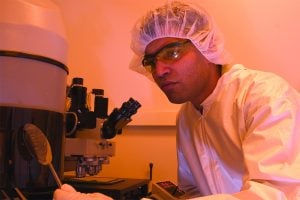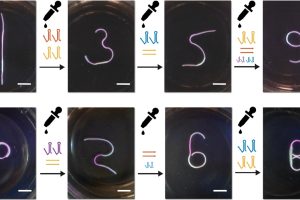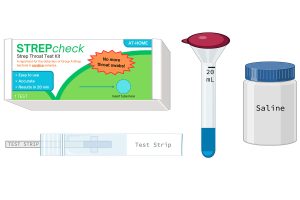David Gracias, a professor of chemical and biomolecular engineering, is an internationally recognized researcher (h-index 76) in micro/nanotechnology, self-folding materials, and physical intelligence. He has secondary appointments in the departments of Chemistry and Materials Science and Engineering as well as the Laboratory for Computational Sensing and Robotics (LCSR) and the Institute for NanoBioTechnology (INBT). His secondary appointments at the Johns Hopkins School of Medicine are in the Department of Oncology, the Center for Microphysiological Systems (MPS), and the Sidney Kimmel Comprehensive Cancer Center (SKCCC).
Gracias’ laboratory’s creative and multidisciplinary approach leverages conventional microelectronic chip fabrication for biofabrication and biointerfaces. His laboratory utilizes elements from biotic (DNA, bacteria, cells) and abiotic (optical, electronic) worlds to create bionic and bioinspired structures. Apart from state-of-the-art lithography (photo, e-beam, and nanoimprint) and 3D printing for fabrication, the laboratory utilizes state-of-the-art fluorescence, FT-IR, Raman, and related spectroscopies; electron and probe microscopy; RF measurements such as GHz spectrum analysis; electrochemical methods such as potentiometry and chronoamperometry; electrophysiology and four-point electrical testing with femto-amp resolution for characterization. Students also utilize various statistical, analytical, and finite element modeling tools to aid in design and analysis.
Ongoing research projects in the Gracias Lab include engineered living materials, autonomous grippers for drug delivery and surgery, thermobiochemically responsive soft robots, tubular cellular biosensors, microphysiological systems, and organoid intelligence (OI).
His pioneering contributions are described in over 200 technical publications, including a dozen in high-impact journals such as Science, PNAS, Nature-X, and Science-X. Gracias Lab’s research contributions have been highlighted by government agencies such as the NIH, NSF, and the U.S. Army and in the press, including The New York Times, Popular Mechanics, Discovery Channel, Forbes Magazine, and Scientific American.
Gracias is a prolific inventor and holds 36 issued patents, with notable inventions on microchip backend integration, self-assembly, self-folding polyhedra, curved, folded, and integrated biosensors, microphysiological systems, thermoresponsive and DNA programmable soft-robots, untethered microgrippers and microinjectors. Several of these patents have been put into commercial practice, and his engineering translational efforts include co-founding a start-up that was later acquired.
He was named a 2024 NAI Fellow and has been recognized by several prestigious awards, including the NSF Career, NIH Director’s New Innovator, Beckman Young Investigator, Camille Dreyfus Teacher Scholar, and the Friedrich Wilhelm Bessel Award. He is an elected Fellow of leading cross-disciplinary international scientific and engineering societies, including the APS (physics), RSC (chemistry), AAAS (science), AIMBE (medical and biological engineering), and IEEE (electrical engineering).
Gracias received his PhD from U.C. Berkeley and was a postdoc at Harvard University in the labs of Gabor Somorjai and George Whitesides, two U.S. National Medal of Science recipients.



